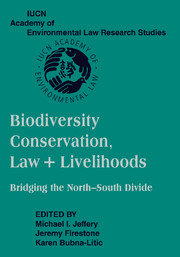 Biodiversity Conservation, Law and Livelihoods: Bridging the North-South Divide
Biodiversity Conservation, Law and Livelihoods: Bridging the North-South Divide Book contents
- Frontmatter
- Contents
- Acknowledgments
- Message from Kofi A. Annan, Secretary-General of the United Nations
- Macquarie Statement
- Contributors
- Introduction
- PART ONE THE CONTEXT
- PART TWO BIODIVERSITY: ITS CONSERVATION
- PART THREE CONSERVATION MEASURES
- PART FOUR USES OF COMPONENTS OF BIODIVERSITY
- PART FIVE PROCESSES AFFECTING BIODIVERSITY
- PART SIX BIOSECURITY ISSUES
- 25 Prevention and Control of Alien Invasive Species – China's Implementation of the CBD
- 26 Who Is to Blame? Liability and Redress Related to GMOs
- 27 The Reality and Effect of “Advance Informed Agreement” under the Cartagena Protocol
- PART SEVEN ACCESS AND BENEFIT-SHARING
- Index
27 - The Reality and Effect of “Advance Informed Agreement” under the Cartagena Protocol
Published online by Cambridge University Press: 31 July 2009
- Frontmatter
- Contents
- Acknowledgments
- Message from Kofi A. Annan, Secretary-General of the United Nations
- Macquarie Statement
- Contributors
- Introduction
- PART ONE THE CONTEXT
- PART TWO BIODIVERSITY: ITS CONSERVATION
- PART THREE CONSERVATION MEASURES
- PART FOUR USES OF COMPONENTS OF BIODIVERSITY
- PART FIVE PROCESSES AFFECTING BIODIVERSITY
- PART SIX BIOSECURITY ISSUES
- 25 Prevention and Control of Alien Invasive Species – China's Implementation of the CBD
- 26 Who Is to Blame? Liability and Redress Related to GMOs
- 27 The Reality and Effect of “Advance Informed Agreement” under the Cartagena Protocol
- PART SEVEN ACCESS AND BENEFIT-SHARING
- Index
Summary
There is considerable controversy about whether, and to what extent, genetically modified organisms (GMOs) pose a threat to the biodiversity of the earth. It is important, for the purposes of this chapter, to note that GMOs are organisms, plants, or animals that are not derived from traditional breeding techniques. They are produced using biotechnological methods known as recombinant DNA, which is the latest evolution of genetic engineering. It involves the transfer of an alien gene into the genetic code of an organism such that the organism bears certain “desired” new characteristics. The potential risks presented by GM crops for biodiversity include: the impact on nontarget organisms such as insects, birds, and micro/fauna and flora; gene transfer from the GM crop into related species; persistence or invasiveness of GM crops; the potential adverse effects of altered farm management practices, required by GM crops, on biodiversity; and the potential adverse impact on the centre of the origin of species. Yet, there are many who extol the environmental benefits of GM crops that require fewer fertilisers, herbicides, and pesticides. Others point to the fact that there will be nine billion people by 2050 concentrated in developing countries. Their food security is tenuous given the shrinkage of available farmland and decreasing productivity caused by housing, infrastructure, and climate change.
However, given the potential threats posed by GMOs, it seems axiomatic that their release into the environment must be regulated in accordance with the principles of ecologically sustainable development.
- Type
- Chapter
- Information
- Biodiversity Conservation, Law and Livelihoods: Bridging the North-South DivideIUCN Academy of Environmental Law Research Studies, pp. 500 - 526Publisher: Cambridge University PressPrint publication year: 2008


